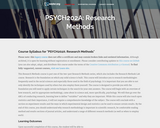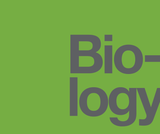
- Subject:
- Psychology
- Material Type:
- Unit of Study
- Provider:
- Rice University
- Provider Set:
- OpenStax College


By the end of this section, you will be able to:
Explain how scientific research addresses questions about behavior
Discuss how scientific research guides public policy
Appreciate how scientific research can be important in making personal decisions

This course will introduce the student to research methodologies frequently used in the social sciences, and especially those used in the field of psychology. This course covers the basics of conducting research, touching upon statistics and their importance (although it does not require a comprehensive knowledge of the subject). The course will conclude with a section on experimental design. By the end of this course, the student should understand why research methodology is important in scientific research, be comfortable reading procedural and methodological sections of journal articles, and understand how to employ different research methods. (Psychology 202A)

This is a review of an OER biology textbook.This resource was reviewed by Dr. Achim D. Herrmann (Department of Geology and Geophysics, LSU).This resource is available here: https://louis.oercommons.org/courseware/6

This course will introduce you to a general overview of the biological world. Important concepts will be reinforced and expanded upon through completion of weekly laboratory activities and homework assignments. Upon successful conclusion of the course, students will be able to do the following: Describe the nature of science, including its methods and its limitations; Describe the basic methodology of doing science and the scientific method; Use the scientific method to study everyday situations as well as in laboratory/field investigations; Identify, describe, and explain at a rudimentary level and present examples of, the characteristics common to all living things; Explain that living organisms are composed of molecules which interact in a variety of different chemical reactions necessary to sustain life; Explain that living organisms are comprised of one or more cells and are classified as prokaryotic or eukaryotic based on cellular characteristics; Describe the hereditary information possessed by living and explain how that information determines the cellular characteristics and functions (including basic Mendelian genetics); Explain and describe, with examples, the diversity of life, at different levels (basic molecular to ecological) and how it is hierarchically organized into systems; Explain how evolution by natural selection occurs, and describe the evidence that supports the theory of evolution; and more.